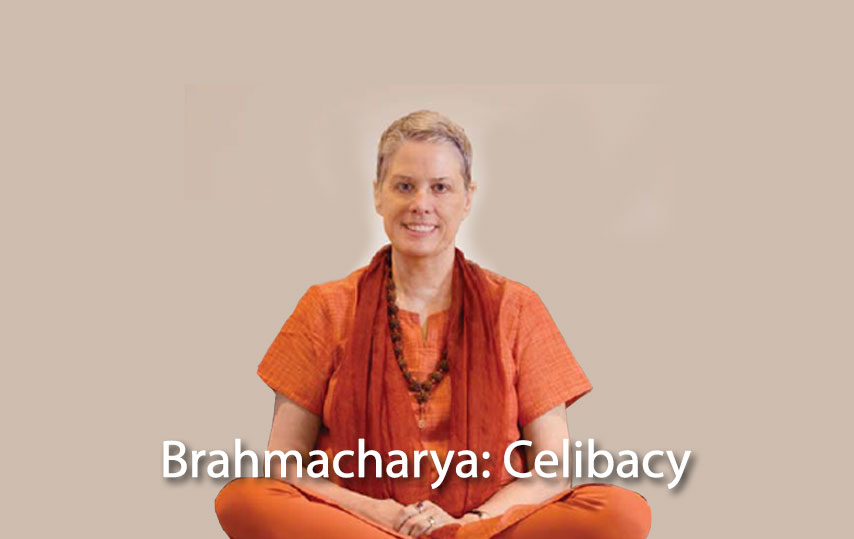As a swami, I have taken vows of celibacy, having chosen that lifestyle long before I was given this initiation.
I recognise that an article on celibacy can stir up a lot of issues, mainly because sexuality brings a hotbed of issues with it, regardless of your sexual history, orientation or current activity. Any time you add sex to a relationship or a conversation, it becomes very tricky. This is one of the reasons that Yoga recommends the practice of celibacy, because it is harder to sort out your subterranean issues when sex is involved. Yet celibacy By is not easy either, especially if you want to avoid suppression, repression, self-denial and withdrawal from relationship. Yogic celibacy is a way of uncovering the hidden dimensions within, not a way to suppress or repress anything; it is a way to become more open and available in relationship, not a way to withdraw.
Sexuality such a tricky subject that many teachers and writers describe Brahmacharya as “control of the senses” rather than being the practice of celibacy. I find it interesting: the authors with Sanskrit names, especially the swamis, write about celibacy; other writers describe sense-control. It is very clear that Brahmacharya is not sense-control, an important practice which is included in the next yama, aparigraha – non-greediness. You must control your senses in order to become free from greed.
What does the practice of Brahmacharya provide? Patanjali promises in his Yoga Sutras:
Brahmacharya-pratishthaayaam veerya-laabhah. (2.38)
One ?rmly established in celibacy gains potency (strength and power).
To understand this, all you have to do is consider sexuality’s effect on your body and mind, which is easy to understand if you have ever overdone it. You are physically drained – totally exhausted. Worse, your mind is unfocused, fragmented and erratic. You can easily see that those who devote their mind and life to the pursuit of sexual pleasures suffer from a state of depletion for which they must compensate with frequent stimulants. This is not a yogic lifestyle, nor do they enjoy a yogic body and mind.
You might ask: what about the middle road? The middle road is always a safe bet, where you get to indulge in your favourite things, but only by a middling amount. To live a balanced life is the goal for many people, but not what Yoga prescribes. The goal of Yoga is not balance, but an extreme state of joy and presence. You have tasted it after your Yoga class or home practice, and it keeps getting better the longer you have been doing Yoga. The sages tell us that it is better than anything sex can provide.
This means that sex is not all that it is reputed to be. As wonderful as the experience of good sex can be, you cannot rely on it for your happiness or your sense of self-worth. It is not reliable: sometimes it works and sometimes it doesn’t. By contrast, Yoga always works, plus it gives you something that sexuality cannot – a sense of self that comes from the deepest source within you.
Let us consider some practicalities; what is celibacy, really? Brahmacharya, like all the other yamas, means you refrain from doing things that other people consider to be normal. Celibacy means you refrain from sexual activity on the levels of physical action, speech and thought. People have asked me which types of sexual activity they can still do: can they still make out or what about phone sex? If you are practising this yama, these are out. Even thinking about sex is out, and you won’t know how hard that is until you try. It is amazing how many of your Bouncy Castle thoughts are sexual. More importantly, the difference in the quality of your mind is tangible when you decide to refrain from them. Your mind will be much quieter. You will enjoy a new level of mental clarity and your mind will be more expansive. You will feel more compassionate and understanding toward everyone. Living with your mind in the gutter undermines everything.
There are special rules for married couples when both of them want to practise celibacy. There are two important words in the previous sentence: “married” and “both”.
Let us begin with the easy one, “both”.
One partner must not enforce celibacy on the other. Without doing Yoga, this often happens in the stages and phases of relationship, but your Yoga practice may naturally bring you to a point where you have less interest in sexuality for a time. You must discuss this with your partner. If this discussion is difficult for you, I will ask you why you are having sex with someone with whom you cannot discuss sex. Your readiness for a period of celibacy is an important consideration in the relationship, but their need for the sexual part of your relationship is important as well. It may be that your partner relies on sexuality for their primary means of experiencing and expressing love. This can become an opportunity to expand your modes of loving communication, as well as an opportunity for both of you to be more conscious about the sexual part of your relationship.
Yoga’s teachings on celibacy insist that a married couple, when both choose to be celibate, must still have sexual relations once a month. The physical part of their relationship is important and must not be discarded. As I pointed out above, the key word is “married”. This is because, if you have not made a marital commitment to each other, you have to look at the reasons why. Some yogis have said to me, “We don’t need to get married. Our commitment is the same as if we were.” I usually ask, “If that is so, why are you not getting married?” The look on their face is amazing as they instantly see the things that keep them from a full commitment, whether they are things in their partner or in themselves. If you are not ready to marry this person, Yoga says you should not be having sex with him or her.
Sex is too little respected in our 21st century. The power of the sexual experience must be respected. The energetic ties that sexuality creates must be respected. Sex has the ability to vacuum up all the issues in your life and telescope them into one relationship; this concentration must be respected. Sexuality churns your mind and emotions like nothing else can.
If you truly respected the power of sexuality, you would make better decisions about it. To take a vacation from sexuality is a wonderful way to begin sorting out the incredible tangle of fears and desires that keep you from living a conscious life.
Yoga prescribes a period of celibacy when you are deepening your studies. The pace and depth of learning is seriously impaired when you are sexually active; every school teacher knows this. When you take a training or a retreat, you want to devote all your time and energy to the deepening and the learning that is available to you. Similarly, you can create an at-home Yoga intensive with some time and space for you to ?nd your Self without being entangled in the confusing pressures of sexuality.
Patanjali’s promise is found in your own internal energies. One who has mastered celibacy has also mastered sexuality, which holds the creative force that brought the universe into being. Such a yogi is called urdhvareta, meaning that the energies that usually ?ow downward and outward in sexuality are redirected and ?owing upward, toward God, toward your own enlightenment.
The potency that becomes available to such a yogi gives them a capacity far beyond most people, including a capacity to do many things as well as a capacity to love and to embrace all that life offers. Do more Yoga.


















 Other
Other